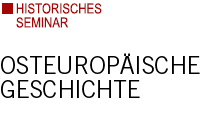Marina Shcherbakova
Dissertationsprojekt: Soviet Jewish museums within the framework of the national policies of the USSR
The brief flourishing of Soviet Jewish ethnography in the interwar period was facilitated by two concurrent phenomena: the implementation of Bolshevist nationality policies in the 1920’s – 1930’s and revolutionary-era debates about Jewish national identity and Jewish cultural heritage. The confluence of these two developments profoundly advanced the museological and scholarly study of Jewish art and objects of Jewish material culture in the first decades of Soviet power. This scholarship developed as a logical extension of earlier studies in the field of Jewish history and ethnography as they were re-interpreted in the 1920-s within the framework of Soviet ideology. However, it reached far beyond the romanticism of the ethnographic discourse in the Jewish nationalist polemics of the late Imperial period and received its fundamental significance as one of the cultural technologies of rule in the Soviet Union.
The active stage of Jewish museology from the mid-1920’s to the early 1930’s resulted in outstanding collections presented in the Jewish museums of Samarkand, Odessa and Tiflis. Soviet authorities, however, regarded the Jewish ethnographic project rather as an instrument of propaganda, the promotion of atheism and nationalization, and sociological information acquisition and control. Jewish museums and exhibits served as an important vehicle for promoting the ideas of the Soviet political and academic leadership, and this controversial cooperation between scholarship and ideology in the field of Judaica is the leading question of this dissertation. Of special interest are the strategies of establishing a new sense of national community and shaping the narrative of Soviet Jewish culture and collective history. Marina Shcherbakova will provide insights into the dynamics of the Soviet Jewish museology in its transnational dimensions -- in Usbekistan, Ukraine and Georgia – and will consider the role of Jewish ethnography within the broader Soviet anthropological discourse.
Curriculum Vitae:
2004 St. Petersburg State University Diploma "German Philology"
2005-2012 University of Northern Iowa/ Trier University/ Potsdam University Studies of Yiddish, German Philology, and Jewish Studies. Master of Arts in "German Studies"
2012-2014 Assistant lecturer at the Department of Jewish Culture, St. Petersburg State University
2012-2015 Associate at the Jewish Division of the Russian Ethnographic Museum, St. Petersburg
Since October 2015 Doctoral student, academic advisor Prof. Dr. Tanja Penter, Dissertation title: "Soviet Jewish Museums within the Framework of the Nationalities Policy of the USSR"
Since September 2015 Fellow of the Rothschild Foundation (Hanadiv) Europe

